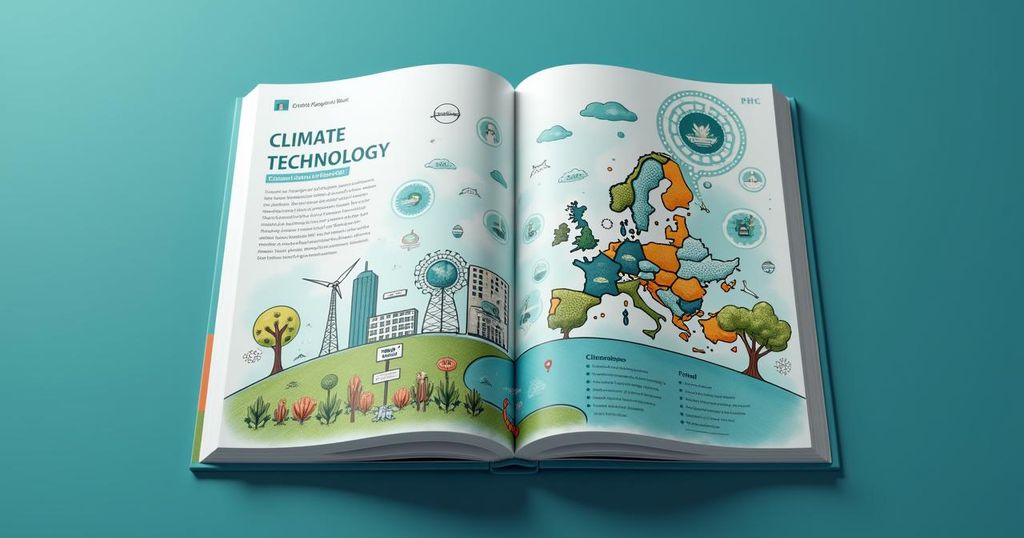Climate technologies are essential for achieving global net-zero emissions by 2050. A study by McKinsey indicates a need for many unicorns and decacorns in climate tech by 2030. To guide startups, proper resources and collaboration are crucial, leading to the creation of *The Climate Brick*, a strategic playbook for fundraising and scaling processes in the climate tech sector. The approach emphasizes engagement among stakeholders and continuous improvement based on ecosystem feedback for long-term sustainability in combating climate change.
Climate technology is becoming increasingly vital in the transition to achieve net-zero emissions globally, with projections indicating that these technologies could reduce 90 percent of man-made emissions by 2050. According to analyses by McKinsey, reaching this goal necessitates the emergence of approximately 1,000 unicorns (valued at $1 billion or more) and 300 decacorns (valued at $10 billion or more) within the climate tech sector by 2030. However, the journey of fundraising and scaling for climate tech companies poses significant challenges, requiring a concerted effort to navigate complexities and stakeholder dynamics. To address this issue, a consortium of venture capitalists, in collaboration with McKinsey, has examined the paths taken by 3,000 climate tech start-ups and conducted over 100 interviews with various ecosystem stakeholders. Insights from this research culminated in The Climate Brick, a comprehensive playbook aimed at facilitating fundraising and scaling strategies for climate technology ventures. At the Green Business Building Summit held in Stockholm, Ted Persson and Sandra Malmberg of EQT Ventures, along with Rokas Peciulaitis of Contrarian Ventures, discussed the formation of The Climate Brick. They highlighted the need for clear guidance for entrepreneurs who often grapple with critical questions regarding financing and milestone achievement. Sandra Malmberg articulated, “I meet maybe three or four founders a day… they spend so much time trying to understand what they need to deliver on in order to unlock financing.” This initiative aims to alleviate some of these burdens, allowing founders to focus on expanding their enterprises instead of becoming mired in the intricacies of fundraising. The playbook comprises findings from the analysis of various scaling journeys across climate tech companies, distilled into seven distinct types, which represent different pathways to growth. Each entry in The Climate Brick provides specific guidance on financial, commercial, and product-related dimensions, elucidating necessary technology and execution milestones along with key strategic insights termed “critical unlocks.” Participants in the ecosystem are encouraged to collaborate extensively to ameliorate their chances of success. As articulated by Ted Persson, “The climate tech journey is way more complex. There are many more stakeholders: there’s the founder and the equity investor, of course, but also the universities… supply partners, regulators…” This reflects a shift from a competitive mindset to a cooperative model that emphasizes shared objectives among stakeholders. They actively organize workshops, named Bricknics, to harness communal knowledge for scaling strategies. The feedback received thus far has underscored the utility of The Climate Brick as a vital resource for founders and investors alike, serving as a roadmap for operational excellence and enabling informed decision-making. However, the creators acknowledge room for improvement; future iterations may delve deeper into aspects such as the capital stack and provide more granular strategies to suit a diverse range of companies. In conclusion, The Climate Brick represents not just a manual, but a movement towards collaborative progress in climate tech, aspiring to support a scalable network of technology solutions to meet global climate targets. The creators envision ongoing iterations of the resource as they seek to collaboratively build a sustainable future.
The significant role of climate technologies in mitigating global carbon emissions is pivotal for achieving net-zero levels by 2050. With ambitious goals established by organizations like McKinsey, stakeholders must foster innovation and successfully launch large-scale enterprises to combat climate change effectively. However, fundraising and scaling processes for climate tech enterprises present unique complexities, requiring a clear understanding of both sector-specific needs and stakeholder dynamics. This necessitates comprehensive resources and supportive frameworks to facilitate successful entrepreneurial journeys within this vital field.
In summary, *The Climate Brick* emerges as a critical tool to aid climate tech start-ups and scale-ups in navigating the intricate fundraising landscape. By emphasizing collaboration, strategic planning, and shared goals among various stakeholders, it aims to diminish barriers to funding and scaling. With ongoing enhancements based on community feedback, the initiative aspires to drive substantial advancements in climate technology, ultimately contributing to a net-zero future.
Original Source: www.mckinsey.com

Leave a Reply